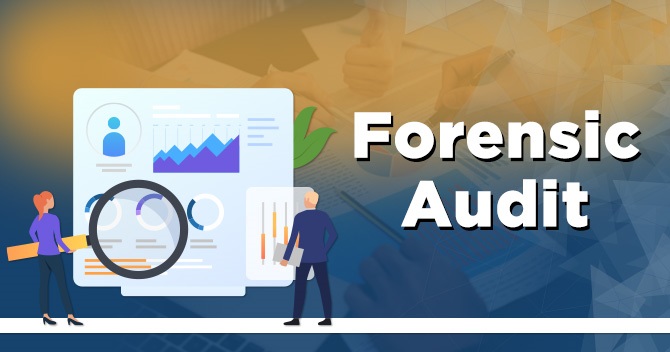Forensic Audits
A forensic audit is an examination and evaluation of a firm’s or individual’s financial records to utilize it as evidence in the court of law or legal suits. It serves as a backing to prove a fraud in the business in an apparent risk prone environment. Forensic audits have requirement of the expertise of accounting and auditing procedures along with expert knowledge about the legal framework of such an audit. A forensic audit can be conducted in order to prosecute a party for fraud, embezzlement or other financial allegation to make the financial records more reliable.
Forensic audits cover a wide range of investigative activities to reduce the corporate fraud. Forensic audits could have those situations also that do not involve financial fraud, namely disputes related to bankruptcy filings, business closures, and divorces. It includes detailed planning of task aimed at documenting, determining and calculative analysis.
Why is a forensic audit conducted?
Forensic audit investigations are made for several reasons, including the following:
Corruption
In a Forensic Audit, while investigating fraud, an auditor would look out for:
- Conflicts of interest – When a fraudster uses his/her influence for personal gains detrimental to the company. For example, if a manager allows and approves inaccurate expenses of an employee with whom he has personal relations. Even though the manager is not directly financially benefitted from this approval, he is deemed likely to receive personal benefits after making such inappropriate approvals.
- Bribery – As the name suggests, offering money to get things done or influence a situation in one’s favor is bribery. For example, Telemith bribing an employee of Technosmith company to provide certain data to aid Telesmith in preparing a tender offer to Technosmith.
- Extortion – If Technosmith demands money in order to award a contract to Telemith, then that would amount to extortion.
What are the Reasons for Conducting a Forensic Audit?
Forensic audit investigations may expose, or confirm, various kinds of illegal activities. Normally, instead of a normal audit, a forensic audit is used if there is a possibility that the evidence gathered would be used in court.
The forensic audit process is similar to a traditional financial audit — planning, gathering evidence, and writing a report — with the additional step of a possible appearance in court. The lawyers on both sides offer evidence that the crime is either discovered or disproved, which decides the harm sustained. They explain their conclusions to the defendant should the case go to trial before the judge.
How to conduct Forensic Audit?
The process of conducting forensic audit is similar to other audit. These are like planning, collecting audit evidences, writing a report, with an additional step of a potential court appearance.
Planning and Investigation of facts
At planning stage, the forensic auditor and entire team will plan their investigation to achieve objectives, such as identifying what fraud, Determining the period during which the fraud occurred, discovering how the fraud was concealed etc.
Collecting Evidences
The evidences collected during the audit should be adequate to prove the fraud. Forensic auditors must take precautions to ensure that documents and other evidence collected are not damaged or altered by anyone intentionally or unintentionally.
Following points should consider while collecting evidences
- Any fraud or negligence took place?
- Is the effect material?
- Who are responsible people and how much can be recovered.

